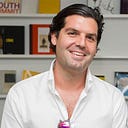Alejandro Betancourt: Overconfidence Is a Big Mistake in Business
Alejandro Betancourt may be the very definition of an entrepreneur. He’s the director and controlling party of O’Hara Financial, an international investment and asset management group, but he also serves as President of sunglasses company Hawkers. He’s also the founder of Auro Travel, a ride-sharing company that operates similar to Uber in Spain.
Along the way, he’s had an amazing track record of successful companies and investments, but he cautions investors to never get overconfident. If everything stayed the same, you might be able to manage, but the markets, economy, and consumer behavior are constantly changing and evolving. You might think, he says, that everything is going to keep going your way and fail to prepare for when things do change. “You lose the ability to predict correctly because you expect everything to continue the same way it has,” he said.
Yet, recognizing trends and patterns, and being prepared to evolve as things change, is the key to growing sustainable businesses.
That’s what happened with Hawkers. The founders had initially created an online store selling second-hand goods, but a year and a half after creation, the group realized they needed to broaden their revenue stream. So, they started developing online stores for other businesses. Based on the success of these online stores, they started their own online business selling sunglasses and eventually created their own brand.
Betancourt led a €50 million ($52 million USD) in 20916 and was appointed as President in November 2016. The company has now sold some 4.5 million pairs of sunglasses and generates more than €94 million ($100 million USD) annually.
Everything Changes
Betancourt said it is crucial to stay on top of emerging trends if you want to remain competitive. “The world is changing so fast,” he said. “Everything changes. With new technology, there is constant adaptation.”
He points to the fax machine as an example. 25 years ago, we all did business using fax machines. “The new generations don’t even understand what a fax machine is,” he said. Social media also changed the dynamic, especially for direct-to-consumer products. Not only did it provide a new vehicle for advertising, but it allowed brands a more direct way to connect with customers.
Hawkers’ early success was fueled by leveraging the power of the internet, social media, influencers, and brand ambassadors on college campuses. By recognizing these emerging marketing trends, Hawkers has now amassed more than 6.6 million likes on its Facebook page and now sells more than 10,000 pairs of sunglasses every day.
In fact, the company’s success selling on Facebook is one of the case studies the social media giant uses as an example of how to do it right under Betancourt’s leadership.
You Must Be Ready to Adapt
Most entrepreneurs will tell you about their early failures and what they learned from them. When you’re on a winning streak, it’s easy to forget these early lessons. Investors and those running businesses often need short memories to push forward after adversity, but they can also judge their success based on their most recent ventures.
When you’re winning and doing well, it can feel like you can do no wrong, said Betancourt. While entrepreneurs need the confidence to continue to push, it can turn to arrogance. The best companies maintain the balance between confidence and humility — constantly assessing their market position and striving to succeed. They pay attention to competitors, industry changes, customer behavior, and economic indicators.
Richard Thaler agrees with Betancourt. Thaler is a professor of Behavioral Science and Economics at the University of Chicago Booth School of Business and a 2017 Nobel Memorial Prize winner in Economic Sciences. “I think the biggest mistake people make…is overconfidence,” Thaler told Barron’s. “It’s very easy to think you’ve figured this stuff out.”
So, when things change, some companies assume everything will be fine and simply fail to adapt. History is littered with companies that failed to recognize trends or adapt until it was too late. Blockbuster, Myspace, Blackberry, and Polaroid are just a few that didn’t adapt.
Kodak engineers actually invented the world’s the first digital camera but sold it fearing a threat to its film business. Nokia invented the first smartphone but failed to capitalize and finally sold their hardware business to Microsoft after capturing just 3% of the smartphone market.
“We need to be prepared that everything is changing constantly, and we need to adapt into that, Betancourt said.
Image provided by Alejandro Betancourt
Originally published at https://www.businessfirstonline.co.uk on August 1, 2022.
